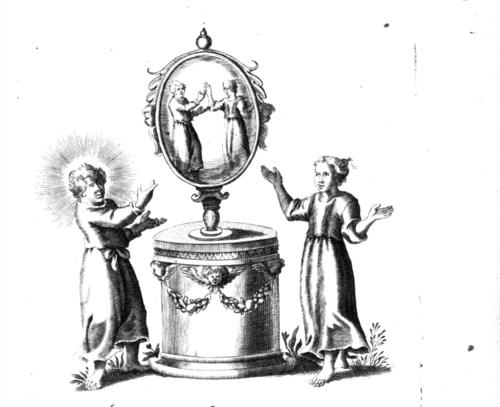
1 Corinthians 13:1-13 / Luke 18:31-43
Can we love without knowledge? We surely think so. Love, after all, is an affair of the heart. It is as true of infants at the breast and toddlers at their mother's knee as it is of doctors, lawyers, and ministers of state. Love, surely, is what can bind even the simplest of us to the most profound. Even the saints attest as much. We marvel at the depths of love in the Curé of Ars, but not the clarity of his theological acumen. We are dazzled by the charity of Frances Xavier Cabrini, but do not seek her correspondence to puzzle our way through difficulties in Biblical exegesis. There is much to be gained from patterning ourselves on the love of children, but the thoughts of childhood are quite another matter: When I was a child, I spoke as a child, I felt as a child, I thought as a child. Now that I have become a man, I have put away the things of a child. Love, it seems, can be without knowledge.
Can we know without love? Tragically, we think this, too, can be so. The long, sad, horrifying stories of techniques of terror used by regimes both liberal in constitution and tyrannical in vision, for both the politics of pragmatism and the zeal of ideology, can attest to the presence of knowledge without love. The technical marvel of the guillotine, after all, was a product of the march of knowledge in the eighteenth century. Even closer to home, on a less global and dramatic scale, we can walk by ravages of poverty and illness on our own street corners and, perhaps feeling a slight prick of our conscience, nonetheless walk on by, or seek material aid but utter not one word of genuine care. And if I have prophecy and know all mysteries and all knowledge, and if I have all faith so as to remove mountains, yet do not have charity, I am nothing. Knowledge, then, looks as though it can live, even if only fatally, without love.
Yet, as clear as this picture is, it does not get the case quite right. Love, after all, only makes sense if it is of something true, something known to be true. What divides the holiness of the marriage bed from the shadowy longings of the brothel house is, after all, the truth of what is going on. The passionate unmarried couple might profess that what they do is out of love, but in this they err. Their actions are false, and so their feelings, however sincerely professed, cannot be real love. The child who mocks her peer for dressing poorly, the mother who withholds kindness from a child who will not do as she asks, the husband who seeks to help his wife fulfill her vocation with the back of his hand — we assert that these are not love precisely because they are not true. Without knowledge of who the other person is, who he is not only for me and my desires, but in and for himself, and in his call by God, there can be no love, only sentiment.
This is how the crowd near Jericho goes wrong. Not knowing Jesus rightly, they abuse the blind man. Knowing Jesus falsely, they imagine that Jesus is served by keeping those who suffer from him. In their eyes, his calling out for healing is an offense, and in this they are gravely, potentially fatally mistaken. It is only in knowing him better by his merciful healing that they are able to move from accusation to praise, from malice to love. It is in coming to a deeper knowing of who Jesus is that they can honor him rightly, and come to see the man who now can see not as a nuisance and an obstacle, but as the privileged sign of God's compassion for a world blinded by ignorance and sin. Only in knowledge, do they come to love.
If love only makes sense if it is true, if it is of something known and known rightly, then we must remind ourselves, too, that we do not know anything rightly apart from love. To see the world from the eyes of another means not only to have the same senses and images in our head as in theirs. It means to know the world as they know it, but that means to see in things the value which they hold for the other. It is not enough to know that our brother loves the novels of Jane Austen; to know Jane Austen as he does means to love her books as he loves them, and to love them for his sake. All the more is this true of God. We cannot actually know the things of God, we do not really have prophecy and knowledge, if we do not see things the way God sees them. Anything else, of course, is a failure to see. However, the only way to see things as God sees them is to see with the love that God has, to love them as God loves them, and to love them for God's sake.
This is why we now see only through a mirror in an obscure manner. It is not for lack of revelation. In Christ and the apostolic witness, we have the fulness of all we ever need to know of God. Still, we do not love as we ought, and apart from that love, we really know nothing at all.
Brothers and sisters, our observance of Lent will begin in a short span of days, a pilgrimage to lead us from Jericho to Jerusalem, where all things that have been written by the prophets concerning the Son of Man will be accomplished. Where our love has grown cold, let us seek to know him better. Where our knowledge is dimmed, let us love all the more fervently. It is in knowing God better that we will be able to love, and in our loving that we will see him as he is. Now I know in part, but then I shall know even as I have been known. So there abide faith, hope and charity, these three: but the greatest of these is charity.





